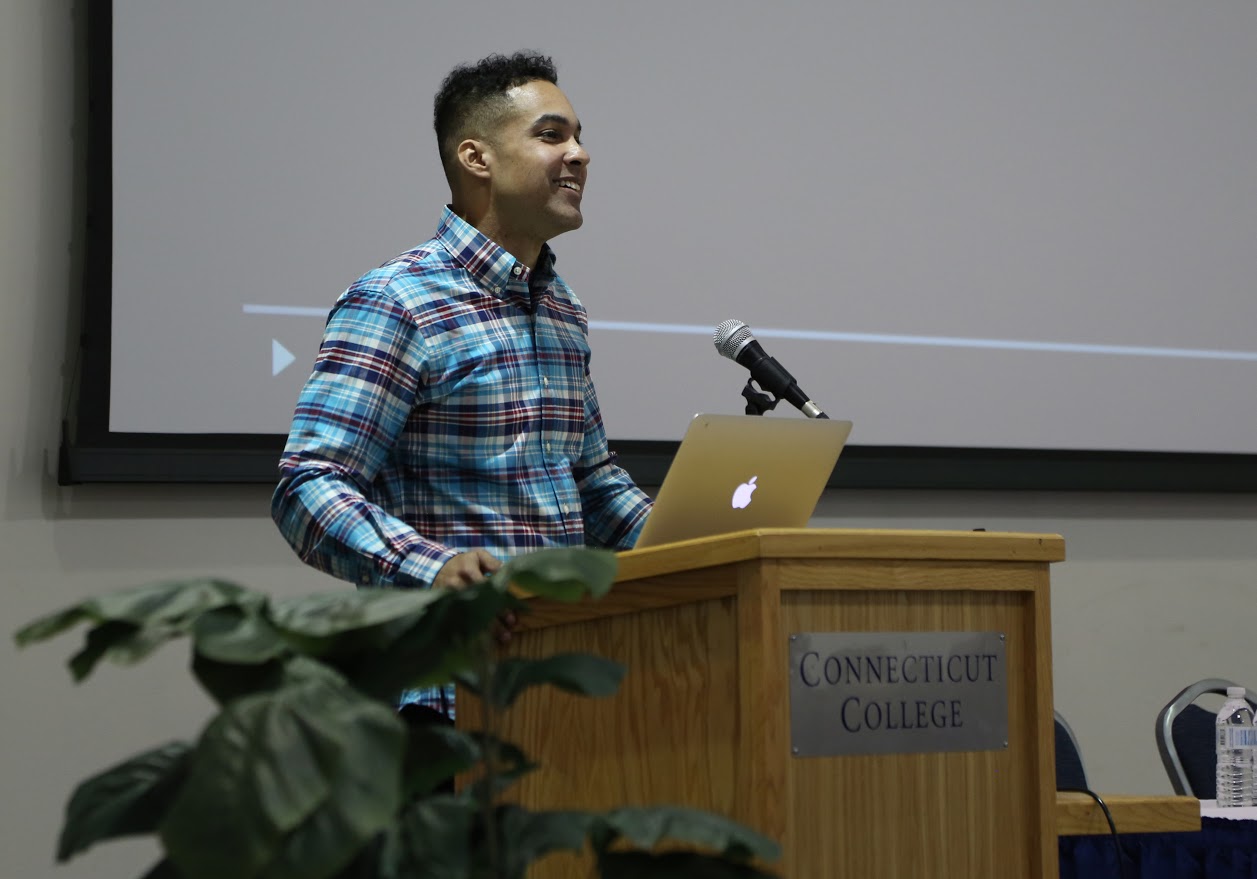The Connecticut College Division of Institutional Equity and Inclusion (DIEI) hosted a town-hall style gathering called “Run Toward Fear: Millennial Activism in the Trump Era” last Monday, April 24.
Despite the heavy police presence and security checkpoint at the entrance – likely due to a number of death threats sent via Twitter to intended panelist and Senior Justice Writer for the New York Daily News, Shaun King – the room was buzzing with excitement.
I got to the event fifteen minutes before the scheduled seven pm start time and was astounded to see the sprawling 1962 room already three quarters of the way filled with people, many of whom were from local community groups that had reserved seats in advance.
At seven o’clock on the dot, Dean of Religious and Spiritual Life Claudia Highbaugh walked onstage to deliver some opening remarks addressing the event before introducing Dean of Institutional Equity and Inclusion John McKnight.
“We are all students tonight,” McKnight said, encouraging attendees to embrace the free exchange of ideas and perspectives brought to the table by the panelists. According to McKnight, this event was important because it aimed to revitalize the energy behind activism and community engagement.
There was an audible gasp when McKnight informed the crowd that he had, “some good news and some bad news.” He continued bad news first by informing us that Shaun King had come down with an illness last minute and couldn’t attend the event. Miraculously, DIEI was able to replace King in a pinch with Youseff Salaam, an activist and member of the Central Park Five.

Panelists from left: Youseff Salaam, Greisa Martinez, Amer Ahmed, Tamika Mallory
Photos courtesy of Olga Nikolaeva
In addition to Salaam, the panelists were Tamika Mallory, co-chair of the Women’s March on Washington; Greisa Martinez, Advocacy Director at the United We Dream Network; and Dr. Amer Ahmed, Director of Intercultural Teaching and Faculty Development at the University of Massachusetts Amherst.
The host of the event, hip-hop activist and scholar Jasiri X, began the discussion by showing the trailer for the documentary The Central Park Five, providing attendees with some background information on the infamous 1989 case in which five young black and latino males were wrongfully convicted of the rape of a white woman in Central Park. The case against these men had deep roots in systemic racism and prompted Donald Trump, then a private citizen, to take out full page ads in multiple New York City newspapers calling for the teens to receive the death penalty.
When asked how he feels about seeing Trump as president, Salaam said optimistically, “I realized that as a people, we can buckle down in spite of oppression… We even made the ghetto look fly.” He also revelled in the fact that “the most powerful man in the world wanted me dead,” and continued to offer a word of inspiration, saying: “I can’t hide. I’m very visible. I can’t run away – I have to run towards fear.”
The next speaker, Martinez, was asked to speak about her fight for undocumented immigrants after a clip played showing a recent appearance of hers on CNN. She spoke passionately and candidly about how for her, “election night was the beginning of nearly 100 days of nightmare.”
“The Trump Era is one of criminalizing anyone who looks foreign,” Martinez said, after decrying the creation of negative narratives about undocumented immigrants in the media.
This fabrication of narratives and stereotypes isn’t limited to African Americans and undocumented immigrants, but instead affects people who identify with a variety of groups. Ahmed, the next panelist, turned the conversation toward misconceptions about Muslim communities, explaining that the United States is rife with Islamophobia and religious intolerance. He went on to provide points of historical contrast that highlight the hypocrisy implicit in U.S.-created narratives that portray Muslims as violent.
“You will not find an equivalent to the Atlantic Slave Trade in any Islamic civilization across history,” Ahmed remarked, rejecting the notion that Muslim-majority countries are evil, as they are often portrayed.
“If it were up to people of color to end racism, it would already be over; if it were up to women to end sexism, it would already be over,” he added, encouraging the people not in those groups to stand up, cooperate and use their privilege to reverse the unjust systems that currently stand in place.
Mallory, the next panelist to speak, was asked how we can stop attacks on communities and save people’s lives. She encouraged attendees to, “think nationally, but play locally,” in reference to the upcoming 2018 mid-term elections.
“We have to live right now in a state of unapologetic truth time,” Mallory said, urging people to have open discussions, no matter how awkward, with their relatives and other members of their community to avoid the spread of ignorant rhetoric and foster civic engagement.
During the Q&A session, a student asked Mallory if true liberation could really happen under a capitalist structure. “Mass incarceration, prison labor – this is all happening because of money… We need to understand our spending power,” she answered, acknowledging the massive amount of money pumped into the economy by people of color. If money is given to companies that profit off of exploitation, that exploitation is likely to continue unhindered.
Two children from a local community group asked the final question of the event: “Does the school to prison pipeline effect multiracial schools?”
Salaam took the question, telling the children: “Even if a student goes to a great, multi-racial school, they still have to leave at the end of the day and deal with the Black experience… When they go home they still go home in their black bodies. They’re still looked at as ‘super predators.’ We have to be conscious, but not let it keep us down.” The crowd was impressed with the children’s question and with Salaam’s response, as a raucous round of applause followed each.










